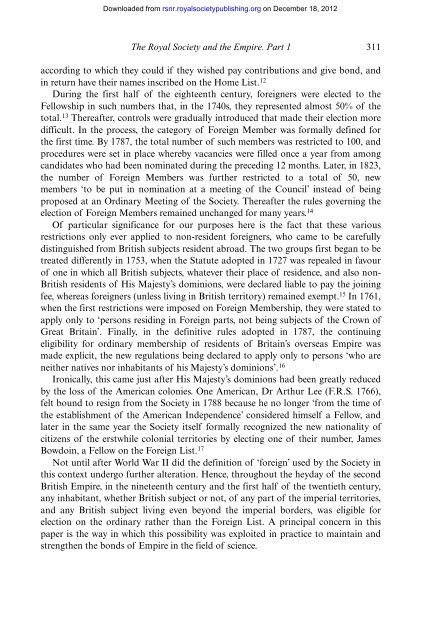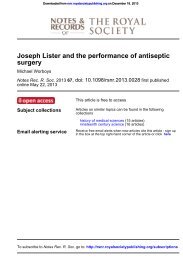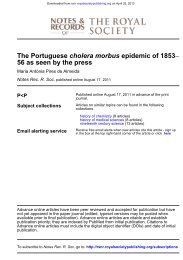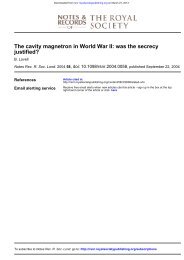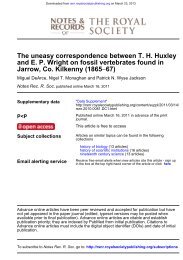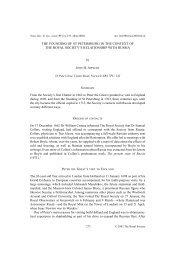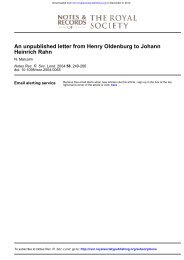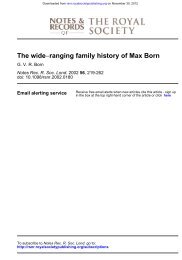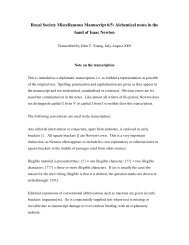Home, part 1 - Notes and Records of the Royal Society
Home, part 1 - Notes and Records of the Royal Society
Home, part 1 - Notes and Records of the Royal Society
You also want an ePaper? Increase the reach of your titles
YUMPU automatically turns print PDFs into web optimized ePapers that Google loves.
Downloaded from<br />
rsnr.royalsocietypublishing.org on December 18, 2012<br />
The <strong>Royal</strong> <strong>Society</strong> <strong>and</strong> <strong>the</strong> Empire. Part 1 311<br />
according to which <strong>the</strong>y could if <strong>the</strong>y wished pay contributions <strong>and</strong> give bond, <strong>and</strong><br />
in return have <strong>the</strong>ir names inscribed on <strong>the</strong> <strong>Home</strong> List. 12<br />
During <strong>the</strong> first half <strong>of</strong> <strong>the</strong> eighteenth century, foreigners were elected to <strong>the</strong><br />
Fellowship in such numbers that, in <strong>the</strong> 1740s, <strong>the</strong>y represented almost 50% <strong>of</strong> <strong>the</strong><br />
total. 13 Thereafter, controls were gradually introduced that made <strong>the</strong>ir election more<br />
difficult. In <strong>the</strong> process, <strong>the</strong> category <strong>of</strong> Foreign Member was formally defined for<br />
<strong>the</strong> first time. By 1787, <strong>the</strong> total number <strong>of</strong> such members was restricted to 100, <strong>and</strong><br />
procedures were set in place whereby vacancies were filled once a year from among<br />
c<strong>and</strong>idates who had been nominated during <strong>the</strong> preceding 12 months. Later, in 1823,<br />
<strong>the</strong> number <strong>of</strong> Foreign Members was fur<strong>the</strong>r restricted to a total <strong>of</strong> 50, new<br />
members ‘to be put in nomination at a meeting <strong>of</strong> <strong>the</strong> Council’ instead <strong>of</strong> being<br />
proposed at an Ordinary Meeting <strong>of</strong> <strong>the</strong> <strong>Society</strong>. Thereafter <strong>the</strong> rules governing <strong>the</strong><br />
election <strong>of</strong> Foreign Members remained unchanged for many years. 14<br />
Of <strong>part</strong>icular significance for our purposes here is <strong>the</strong> fact that <strong>the</strong>se various<br />
restrictions only ever applied to non-resident foreigners, who came to be carefully<br />
distinguished from British subjects resident abroad. The two groups first began to be<br />
treated differently in 1753, when <strong>the</strong> Statute adopted in 1727 was repealed in favour<br />
<strong>of</strong> one in which all British subjects, whatever <strong>the</strong>ir place <strong>of</strong> residence, <strong>and</strong> also non-<br />
British residents <strong>of</strong> His Majesty’s dominions, were declared liable to pay <strong>the</strong> joining<br />
fee, whereas foreigners (unless living in British territory) remained exempt. 15 In 1761,<br />
when <strong>the</strong> first restrictions were imposed on Foreign Membership, <strong>the</strong>y were stated to<br />
apply only to ‘persons residing in Foreign <strong>part</strong>s, not being subjects <strong>of</strong> <strong>the</strong> Crown <strong>of</strong><br />
Great Britain’. Finally, in <strong>the</strong> definitive rules adopted in 1787, <strong>the</strong> continuing<br />
eligibility for ordinary membership <strong>of</strong> residents <strong>of</strong> Britain’s overseas Empire was<br />
made explicit, <strong>the</strong> new regulations being declared to apply only to persons ‘who are<br />
nei<strong>the</strong>r natives nor inhabitants <strong>of</strong> his Majesty’s dominions’. 16<br />
Ironically, this came just after His Majesty’s dominions had been greatly reduced<br />
by <strong>the</strong> loss <strong>of</strong> <strong>the</strong> American colonies. One American, Dr Arthur Lee (F.R.S. 1766),<br />
felt bound to resign from <strong>the</strong> <strong>Society</strong> in 1788 because he no longer ‘from <strong>the</strong> time <strong>of</strong><br />
<strong>the</strong> establishment <strong>of</strong> <strong>the</strong> American Independence’ considered himself a Fellow, <strong>and</strong><br />
later in <strong>the</strong> same year <strong>the</strong> <strong>Society</strong> itself formally recognized <strong>the</strong> new nationality <strong>of</strong><br />
citizens <strong>of</strong> <strong>the</strong> erstwhile colonial territories by electing one <strong>of</strong> <strong>the</strong>ir number, James<br />
Bowdoin, a Fellow on <strong>the</strong> Foreign List. 17<br />
Not until after World War II did <strong>the</strong> definition <strong>of</strong> ‘foreign’ used by <strong>the</strong> <strong>Society</strong> in<br />
this context undergo fur<strong>the</strong>r alteration. Hence, throughout <strong>the</strong> heyday <strong>of</strong> <strong>the</strong> second<br />
British Empire, in <strong>the</strong> nineteenth century <strong>and</strong> <strong>the</strong> first half <strong>of</strong> <strong>the</strong> twentieth century,<br />
any inhabitant, whe<strong>the</strong>r British subject or not, <strong>of</strong> any <strong>part</strong> <strong>of</strong> <strong>the</strong> imperial territories,<br />
<strong>and</strong> any British subject living even beyond <strong>the</strong> imperial borders, was eligible for<br />
election on <strong>the</strong> ordinary ra<strong>the</strong>r than <strong>the</strong> Foreign List. A principal concern in this<br />
paper is <strong>the</strong> way in which this possibility was exploited in practice to maintain <strong>and</strong><br />
streng<strong>the</strong>n <strong>the</strong> bonds <strong>of</strong> Empire in <strong>the</strong> field <strong>of</strong> science.


